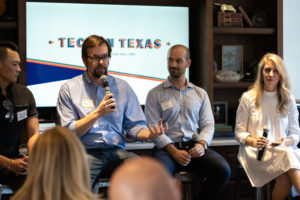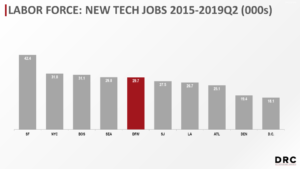Mike Rosa, Senior Vice President, Economic Development
“These days all companies are technology companies,” is becoming a common adage in business conversations – and it’s certainly true in Dallas-Fort Worth.

A recent recruitment trip to San Francisco with my DRC colleague Gloria Salinas further solidified Dallas as a tech-friendly hub. We joined “Tech in Texas,” a recruitment event in downtown San Francisco for high-growth tech startups looking to grow in Texas. The event took place the same August evening the City of Dallas approved an incentive package for San Francisco-based Uber Technologies, Inc. to grow 3,000 jobs in Downtown Dallas within the next three years.
The event hosted a panel of startups that recently relocated or opened regional offices in Texas cities, including Fundbox, a fintech company that recently expanded into Plano.
At the event, it was evident and even more apparent that the Dallas Region offers the high-demand digital workforce that high-growth tech startups require in order to successfully scale their businesses rapidly. Rapid growth for startups usually means adding up to 100 employees in six months to a year and several hundred or even a thousand employees within a couple of years.
Opportunity for Growth

Today, the Dallas Region is home to more than 237,000 high-tech workers and 92,000 creative class workers. One main fact has continued to spur the growth rate of a high-tech workforce and strong tech startup scene: Dallas is one of the most diverse economies in the nation.
Industry diversity appeals especially to high-tech workers building a career because it creates a wide variety of job opportunities. In DFW, the growth rate among app and software developers and network support workers has outpaced the rest of the area’s healthy workforce growth. Consequently, that talent pool attracts software and app development companies who want to be near current and prospective clients to leverage their data, software needs, and potential.
The panelists shared their struggles of scaling with high business costs, such as real estate and salary demands, and hiring and retaining talent in San Francisco’s competitive tech scene. Those struggles have ultimately left an opening for Texas and our region.
Basile Senesi, head of sales and operations at Fundbox, said every startup in the Bay Area strives to be a choice employer and retain employees, but it’s difficult to maintain growth in a competitive market.
Senesi said the Bay Area is reaching the point of discomfort for employees’ quality of life. “At some point, you have to look at your employees and ask, ‘Are you doing the best for them?’” he said.
The discussion moderator asked each of the three panelists to rank the top considerations that were important in the decision to relocate or open a second office. Their unanimous answer: the availability of talent at the prospective location and the ability to attract additional talent.
Senesi said startups must think seriously about where they want the company to be in five years, and consider the inability to scale, expand, and innovate in San Francisco. The ratio of available candidates to high-tech job openings is more favorable in Dallas and the cost savings in real estate provide more opportunities, he said.
The DRC staff on hand echoed those sentiments in one-on-one discussions with San Francisco startups in the audience who came to hear about the relocation process and its benefits. We also had the chance to visit the office of a high-growth startup in Silicon Valley to encourage expansion in the Dallas Region. We returned with an active project in the pipeline and the expectation of more to come.
Mike Rosa leads economic development, corporate targeting, and outreach as the Senior Vice President of Economic Development for the Dallas Regional Chamber.